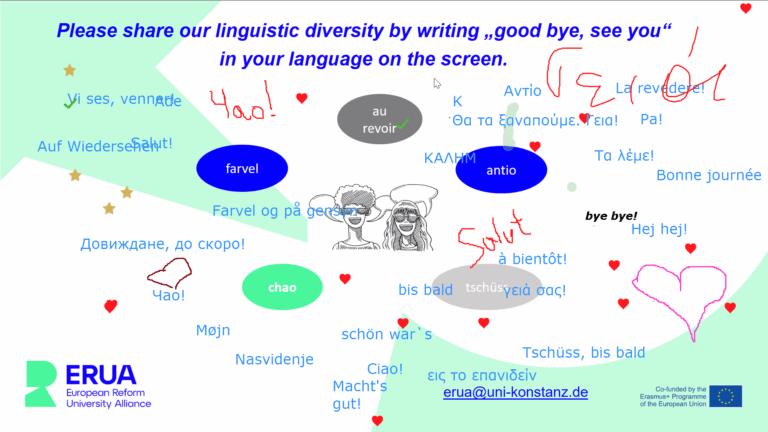The inaugural summit of the European Reform Universities Alliance – ERUA focuses on re-imagining a higher education, its future and progress, sustainability and modernisation in Europe.
Prof. Plamen Doinov, PhD, Rector of the New Bulgarian University, started the event with the words: The European Universities’ project is a high-end experience with multiple levels and dimensions. Certainly we are on the correct path, based on our work over the last 12 months. We’re laying the groundwork for ERUA’s transformation from a pipe dream to a functioning institution with much room to grow.
EU Commissioner Maria Gabriel gave a welcome statement at the First Summit of the Alliance of European Reform Universities (ERUA). She expressed her enthusiasm about the gathering, emphasizing the need for the Alliance’s revisiting the role on European universities in a global context.
The rectors of the five partner institutions presented their work on the development of the multinational environment and the preservation of multilingualism. During the plenary session they also expressed the importance of the digital revolution in building Europe‘s higher education.
The four ERUA workshops prioritized bringing together opinions and ideas and provided direction for future development and international partnerships and collaborations – to “rethink” higher education and research; to update and modernize the teaching and learning processes; to strengthen our community and the connectivity between universities; and to work on the long-term development of university campuses.
Workshop 1
Reform University Ideals and Data Collection
Our task is to rethink and strengthen European reform universities. As part of this, WP2 Reimagining Higher Education and Research is collecting and comparing information about the universities in ERUA and beyond. This workshop was dedicated to the efforts of the WP2 student group, whose main responsibility is data collection. We wanted to listen to the participants’ articulations of reform university ideas, and think of ways tо help and support the realization of these ideas.
Workshop 2
Flexible Joint Programs: challenges and opportunities for European Universities
This workshop aimed to increase the knowledge on joint programmes within the alliance through sharing experience in a “peer learning” format. That supports the alliance’s reflection on the ERUA joint programmes for its future development.
During the workshop, we clarified the key concepts and discussed European terminology, regarding joint programmes. In addition, coordinators presented good practices, giving examples of joint programmes with different structures. The ARQUS Alliance shared its experience in developing flexible joint programs. We also emphasized on the digital opportunities for joint programs and the strategic partnership GO-DIJIP: Integration of digital environments for cooperation in joint programs.
Workshop 3
Empowering higher education communities across Europe: Creating educational pathways and social cohesion in the light of multilingualism
This workshop provided space to explore strategies and opportunities for the development of European educational and research communities in the light of European linguistic diversity. ERUA’s student and staff community aims and actions were presented and discussed with the audience in the context of a science slam battle on the theme Creating knowledge in our minds and communities. The workshop ended with an open discussion on Multilingualism in higher education in Europe: do our Universities reflect the language diversity of our communities?
Workshop 4
A decade of Digital Transformation for Universities: A window for Openness, Innovative Ecosystems and Sustainable Partnerships
The purpose of the workshop was to provide a positive discussion among the partners of ERUA & ERUA University communities:
• Тhe latest trends in the digital transformation of the service sector, with reference to Universities & Research and how Universities are engaging in digital transformations;
• Тhe links between Innovation and Sustainability in the context of Higher Education & Society and how ERUA itself is engaging Students in our Societies.
More than 270 people from various nations came together with the goal of developing a strategy for higher education development and transformation in Europe. Creating a new, one-of-a-kind educational and research environment that serves not only students and researchers, but also businesses and civic society.
The spirit of ERUA could be seen in the words of Annick Allaigre, Chancellor of the Paris 8 University Vincennes-Saint-Denis.
To address the challenges and problems of today, we want to bring together academics from all of Europe and students from various socioeconomic, local or global backgrounds, from both rural and urban setting. Together we aim to shape a modest open and inclusive society. We believe in a European university, where students are truly at the centre of education. It is indeed true that as educators our goal is to attract talents and offer professional training, but also to create an inclusive, engaging and inspiring environment, which is sensitive to civil responsibilities in both a European and international perspective. The success and sustainability of the alliance is based on sharing objectives and creating mutual trust above all.
We believe that our biggest strength as a community is to create and engage all participants in the educational process, joining students, doctoral candidates, researchers and professors, technical and administrative staff and making sure that everyone’s voice is heard. That is how we plan to create a community in close contact with society, where everyone makes their positive and proactive contribution every day. We are all willing to find solutions together and support each other. With no doubts, this is the best way to excellence and to the production of original research.

